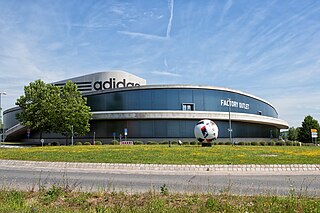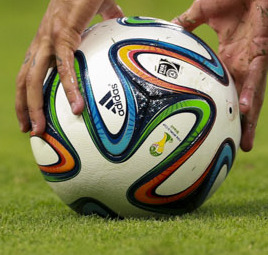
Adidas AG is a German multinational corporation, founded and headquartered in Herzogenaurach, Bavaria, that designs and manufactures shoes, clothing and accessories. It is the largest sportswear manufacturer in Europe, and the second largest in the world, after Nike. It is the holding company for the Adidas Group, which consists 8.33% stake of the football club Bayern München, and Runtastic, an Austrian fitness technology company. Adidas's revenue for 2018 was listed at €21.915 billion.

A penalty shoot-out is a tie-breaking method to determine which team is awarded victory in an association football match that cannot end in a draw, when the score is tied after the normal time as well as extra time have expired. In a penalty shoot-out, each team takes turns shooting at goal from the penalty mark, with the goal defended only by the opposing team's goalkeeper. Each team has five shots which must be taken by different kickers; the team that makes more successful kicks is declared the victor. Shoot-outs finish as soon as one team has an insurmountable lead. If scores are level after five pairs of shots, the shootout progresses into additional "sudden-death" rounds. Balls successfully kicked into the goal during a shoot-out do not count as goals for the individual kickers or the team, and are tallied separately from the goals scored during normal play. Although the procedure for each individual kick in the shoot-out resembles that of a penalty kick, there are some differences. Most notably, neither the kicker nor any player other than the goalkeeper may play the ball again once it has been kicked.

The Spain national football team has represented Spain in international men's football competitions since 1920. It is governed by the Royal Spanish Football Federation, the governing body for football in Spain.

The 2008 UEFA European Football Championship, commonly referred to as UEFA Euro 2008 or simply Euro 2008, was the 13th UEFA European Championship, a quadrennial football tournament contested by the member nations of UEFA. It took place in Austria and Switzerland from 7 to 29 June 2008.

The Primeira Liga, also known as Liga Portugal Bwin for sponsorship reasons, is the top level of the Portuguese football league system. Organised and supervised by the Liga Portugal, it is contested by 18 teams since the 2014–15 season, with the three lowest placed teams relegated to the Liga Portugal 2 and replaced by the top-three non-reserve teams from this division.

The Adidas +Teamgeist is a football made by Adidas and developed jointly with Molten Corporation. It was the official match ball for the 2006 FIFA World Cup in Germany. The plus sign in its name was introduced for trademark purposes, since the regular German word Teamgeist, meaning "team spirit", could not be trademarked.

The Adidas Finale is a brand of football made by Adidas. It is the current official football of the UEFA Champions League, Women's Champions League, and the Youth League; after Adidas took over the contract of official supplier from Nike in 2000. The internal and external design of the ball changes reflecting improvements to football technologies taken from other Adidas-produced footballs. The external design is the "Starball" based on the stars of the UEFA Champions League and the Women's Champions League logo. Each year's ball keeps the branding name of Adidas Finale, excepting suffixes to designate the year.

The 2008 Africa Cup of Nations, also known as the MTN Africa Cup of Nations due to the competition's sponsorship by MTN, was the 26th edition of the Africa Cup of Nations, the biennial football tournament for nations affiliated to the Confederation of African Football (CAF). The tournament was staged at four venues around Ghana between 20 January and 10 February 2008. This was the last Africa Cup of Nations to use the old CAF logo.

The goalkeeper is a position in association football. It is the most specialised position in the sport. The goalkeeper's main role is to stop the opposing team from scoring. This is accomplished by having the goalkeeper move into the trajectory of the ball to either catch it or direct it further from the vicinity of the goal line. Within the penalty area goalkeepers are allowed to use their hands, giving them the sole rights on the field to handle the ball. The goalkeeper is indicated by wearing a different coloured kit from their teammates and opposition.

A football is the ball used in the sport of association football. The name of the ball varies according to whether the sport is called "football", "soccer", or "association football". The ball's spherical shape, as well as its size, weight, and material composition, are specified by Law 2 of the Laws of the Game maintained by the International Football Association Board. Additional, more stringent standards are specified by FIFA and subordinate governing bodies for the balls used in the competitions they sanction.

The 2009 FIFA Confederations Cup was the eighth Confederations Cup, and was held in South Africa from 14 June to 28 June 2009, as a prelude to the 2010 FIFA World Cup. The draw was held on 22 November 2008 at the Sandton Convention Centre in Johannesburg. The opening match was played at Ellis Park Stadium in Johannesburg. The tournament was won by Brazil, who retained the trophy they won in 2005 by defeating the United States 3–2 in the final.
Molten Corporation is a sports equipment and automotive parts company based in Hiroshima, Japan.

The 2009 UEFA Champions League Final was played on 27 May 2009 at the Stadio Olimpico in Rome, Italy. The match determined the winners of the 2008–09 season of the UEFA Champions League, a tournament for the top football clubs in Europe. The match was won by Barcelona of Spain, who beat England's Manchester United 2–0. Samuel Eto'o opened the scoring in the 10th minute, and Lionel Messi added another goal 20 minutes from the end to earn Barcelona a historic treble of La Liga, the Copa del Rey and the Champions League, a feat never before achieved by a Spanish club. The match was refereed by Swiss referee Massimo Busacca.

The 2011 UEFA Champions League Final was an association football match played on 28 May 2011 at Wembley Stadium in London that decided the winner of the 2010–11 season of the UEFA Champions League. The winners received the European Champion Clubs' Cup. The 2011 final was the culmination of the 56th season of the tournament, and the 19th in the Champions League era.

The UEFA Euro 2012 Final was the final match of Euro 2012, the fourteenth edition of the European Football Championship, UEFA's competition for national football teams. The match was played at the Olympic Stadium, Kyiv, Ukraine, on 1 July 2012, and was contested by Spain and Italy. The sixteen-team tournament began with a group stage, from which eight teams qualified for the knockout phase. En route to the final, Spain finished top of Group C, with a draw against Italy and wins over Croatia and the Republic of Ireland. Spain then defeated France in the quarter-finals before beating Portugal in the semi-final after a penalty shoot-out. Italy were second in Group C, with draws against Spain and Croatia, and a victory over the Republic of Ireland. In the knockout rounds, Italy defeated England after a penalty shoot-out, then Germany in the semi-final.

The Jabulani is a football manufactured by Adidas. It was the official match ball for the 2010 FIFA World Cup.

The Adidas Tango 12 was the official match association football of the UEFA Euro 2012, with variants being used for the 2012 Summer Olympics. The ball is named after the original and successful Adidas Tango family of footballs from the late 1970s, but the construction of the Tango 12 is completely different. Variations of the ball have been used in other contemporary competitions including the Africa Cup of Nations and the Summer Olympics – Adidas has not categorised these football as the "Adidas Tango 12" family, however they are listed here due to their similar design.

The 2013 FIFA Confederations Cup Final was a football match to determine the winners of the 2013 FIFA Confederations Cup. The match was held at the Estádio do Maracanã, Rio de Janeiro, Brazil, on 30 June 2013 and was contested by the winners of the semi-finals, Brazil and Spain. Brazil defeated Spain 3–0 with goals from Fred and Neymar, thus breaking Spain's record of 29 competitive games without a defeat.

The Adidas Brazuca was the official match ball of the 2014 FIFA World Cup, which was held in Brazil. It is designed by the company Adidas, a FIFA Partner and FIFA World Cup official match ball supplier since 1970.

The Adidas Telstar 18 was the official match ball of the 2018 FIFA World Cup, which was held in the Russian Federation. It was designed by the company Adidas, a FIFA Partner and FIFA World Cup official match ball supplier since 1970, and based on the concept of the first Adidas's World Cup match ball. The manufacturer of the ball was Forward Sports, a sports equipment supplier based in Sialkot, Pakistan.



















